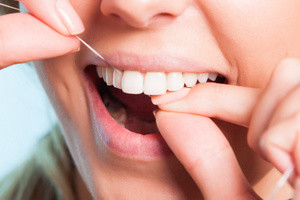
Like any microbiome, there is a mix of both helpful and harmful bacteria in the mouth. Some bacteria is necessary for maintaining a healthy homeostasis for the mouth. On the other hand, there are also some types of bacteria that can be disastrous for our oral health.
The key to combating harmful bacteria is keeping up a strict oral hygiene routine and avoiding common mistakes that can put your oral health at jeopardy. In celebration of National Dental Hygiene Month, Dr. Maggie Chao and her talented team at Pleasanton Prosthodontics are highlighting the best hygiene practices patients should follow.
Dangers Associated With Poor Oral Hygiene
Good oral hygiene can be boiled down to three main components — brushing, flossing, and going to the dentist regularly. This sounds pretty simple, right? Unfortunately, many patients can slack on one of these components, which will end up harming their oral health.
Whether you forget to floss or don’t go to the dentist as frequently as you should, your smile can take the brunt due to poor oral hygiene. Some of the most common oral health problems associated with poor oral hygiene include:
Tooth Decay: Tooth decay occurs when harmful bacteria accumulates and forms a sticky film known as plaque. As this continues to build up, bacteria will take sugars from the foods and beverages we consume to create an acidic substance. This acid will then wear away at the enamel, which is the outer protective layer of the tooth. As enamel erosion continues, decay can rapidly continue and reach the inner layers of the tooth where the dentin and pulp are located.
Patients should be especially cautious of decay reaching the pulp of the tooth because this is where the nerves and blood vessels are located. After the pulp of the tooth has been infected, patients will typically have extreme tooth sensitivity to hot, cold, or sugary foods and beverages.
Chronic Bad Breath: Chronic bad breath, also known as halitosis, can be a common side-effect of poor oral hygiene. Without daily brushing and flossing, food debris can accumulate and cause this problem. The bad odor patients experience happens because the food particles will accumulate and start to decompose.
Gum Disease: Your gum health is also at risk when you have poor oral hygiene. When bacteria accumulates, it can infect the gums and cause inflammation. The gums will appear bright red, swollen, and will bleed easily while brushing or flossing. Gum disease is not only associated with poor dental health, but it has also been linked to several systemic diseases, including stroke, heart disease, and diabetes.
How Can I Improve My Oral Hygiene?
If you’re currently facing severe oral health problems, we strongly encourage you to seek the help of a dental professional. From there, your dentist can identify the next steps to address your specific oral health concerns.
For patients looking to simply improve their oral hygiene routine, there are several steps you can take. The top five oral hygiene tips include:
Brush Your Teeth Thoroughly: We all know that brushing our teeth twice a day is crucial for maintaining a healthy smile, but many of us might not actually take the necessary time to remove plaque. Quickly brushing your teeth won’t be enough to effectively remove plaque and food debris left on your teeth. You should brush for at least two minutes and use small circular motions to properly brush your teeth. Doing this will remove harmful bacteria and plaque that has accumulated in your mouth.
Floss: Are you flossing as frequently as you should? Many patients are guilty of forgetting to floss each day. While it is common to forget to floss, we encourage our patients to truly make it a priority. Throughout the day, it is easy for food particles and plaque to hide away between teeth and underneath the gum line. Brushing alone isn’t enough to address these hard-to-reach areas. Floss your teeth once a day and you should notice a significant improvement in your oral health.
Throw Out Your Old Toothbrush: You should get a new toothbrush every 3-4 months to avoid frayed bristles that no longer effectively remove plaque. A good way to remember to switch out your toothbrush is to do it at the start of every season. If you have an electric toothbrush, you should follow this same rule but instead, simply switch out the brush head.
Limit Sugar Consumption: Bacteria in your mouth will use sugar and create an acid that wears away at your tooth enamel. Although there is sugar in many foods and beverages, you should monitor your intake and avoid excess sugar whenever possible.
Use a Mouthwash: While using a mouthwash isn’t completely necessary, it can be a great additional tool to help improve your oral hygiene routine. There are plenty of mouthwash brands out there that include fluoride, which can help to strengthen the tooth enamel and prevent cavities from forming. Using a mouthwash can also help to wash away excess food particles and bacteria lingering in your mouth.
Contact Our Office in Pleasanton
Making your oral health a priority can be relatively simple by just adding in a few extra steps to improve your hygiene practices. In the case of more serious oral health concerns, contact our office to learn more about the services we offer. To start your journey to a healthier smile, contact our office today to schedule your no-obligation consultation with Dr. Chao.
